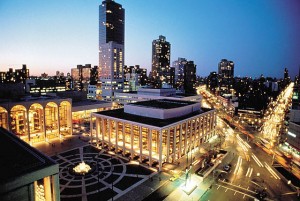My essay in the July/August double issue of Commentary is about Lincoln Center. Here’s an excerpt.
* * *
Lincoln Center, the first major urban performing-arts center in America, was well on its way to completion a half-century ago. The New York City Ballet, the New York City Opera, and the New York Philharmonic had already moved there, and the Metropolitan Opera followed suit in 1966. Theatrical productions began to be mounted in the Vivian Beaumont Theater by the end of 1965, and the Juilliard School and the School of American Ballet relocated to its 16-acre campus a few years later. This unprecedented consolidation remains to this day unrivaled in scope: No other performing-arts center dominates the artistic life of a great American city so totally.
 In recent years, though, Lincoln Center has weathered an equally unprecedented series of crises. The New York City Opera stopped performing there in 2011 and closed its doors two years later. Shortly thereafter, the Metropolitan Opera was forced to contend with a fiscal meltdown that threatens its very survival. Meanwhile, the New York Philharmonic, whose concert hall is closing in 2019 for desperately needed interior renovations, announced that Alan Gilbert, its music director, will be stepping down from that post in 2017 after a tenure widely regarded as lackluster….
In recent years, though, Lincoln Center has weathered an equally unprecedented series of crises. The New York City Opera stopped performing there in 2011 and closed its doors two years later. Shortly thereafter, the Metropolitan Opera was forced to contend with a fiscal meltdown that threatens its very survival. Meanwhile, the New York Philharmonic, whose concert hall is closing in 2019 for desperately needed interior renovations, announced that Alan Gilbert, its music director, will be stepping down from that post in 2017 after a tenure widely regarded as lackluster….
Hence it is unusually timely that Reynold Levy, who served as Lincoln Center’s president from 2002 to 2014, has published a memoir noteworthy both for its candor and its smugness. As its title suggests, They Told Me Not to Take That Job: Tumult, Betrayal, Heroics, and the Transformation of Lincoln Center is even more self-serving than most books of its genre. Levy all too clearly sees himself as the heroic figure who single-handedly wrought “transformational change” in the face of “seemingly intractable problems,” and he believes that most of Lincoln Center’s remaining difficulties are the result of certain of its constituents having stubbornly refused to take his advice….
Levy’s indictments are plausible as far as they go. They ignore, however, the fact that Lincoln Center’s original designers made irreversible miscalculations whose long-term consequences are now glaringly apparent and increasingly dire….
In the end, Lincoln Center is best understood as a historical accident, one that has had a distorting and destructive effect on the performing arts elsewhere in America….
* * *
Read the whole thing here.
